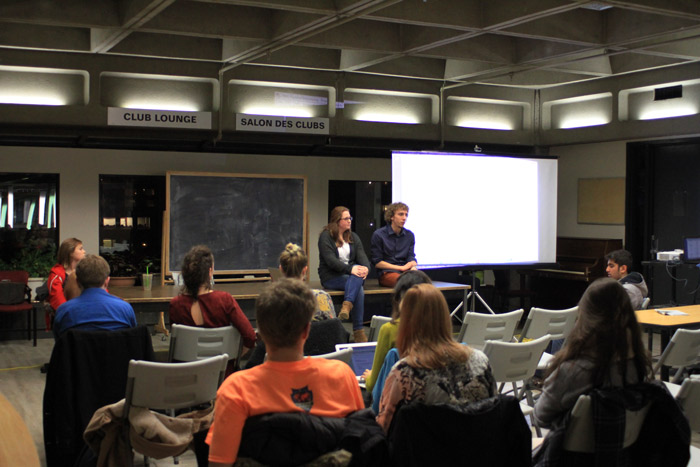Students may soon have a seventh Students’ Society of McGill University (SSMU) executive according to a forum held this past Thursday. VP Finance and Operations Zacheriah Houston, VP Clubs and Services Kimber Bialik, and VP University Affairs Chloe Rourke addressed concerns and answered questions about a potential new structure, as well as the responsibilities of SSMU executives.
Proposed ideas
Houston presented the proposed ideas for a seventh executive portfolio. The plan involved creating a new VP Operations position and renaming VP Clubs and Services to VP Student Life.
“The VP Student Life would […] basically be the VP Clubs and Services, minus the building aspect of that portfolio,” Houston said. “[The] VP Student Life [could then] take on some of the workload from the VP University Affairs. The VP Finance and Operations portfolio would be split into a VP Finance, doing all the finance-related aspects of my current portfolio, and VP Operations doing the student run operations […] as well as our building operations […] and environmental sustainability.”
Bialik stated that for a seventh executive to be added for the following academic year, a referendum would need to be held early next semester.
“Over the next two months or so, we would do more [consultation…] and then run a referendum to amend the constitution in January if that’s what students […] wanted,” said Bialik.
Houston addressed questions regarding the allocation of funding for the salary of the seventh executive. He stated that a specific source is yet to be determined, given current budget constraints from last year’s addition of a permanent staff position, and the loss of commercial tenants in the SSMU building.
“Right now [there] is not a lot of room in the general administration budget,” he said. “You would have to restructure permanent staff positions and different student staff positions to shift the salaries around, or there is no money [….] I actually don’t think that adding an [executive] would necessarily make [the total amount of the collective salaries] increase above what they are now […] but in the short run I don’t really see an easy way to pay for it.”
Houston additionally addressed the possibility of raising the SSMU base fee to garner extra funding.
“You can always increase the base fee, but that’s not something I would do for an exec,” he said. “But that’s something that needs to happen at some point any way. [The base fee] hasn’t been increased [for] quite a long time.”
The need for restructuring
According to Rourke, one of the driving factors behind the addition of a seventh executive, as opposed to student or permanent staff, is the lowered salary that executives receive.
“The reason we’re in favour of a seventh exec is that we’re the cheapest way to get an increased amount of work done,” she said. “Every other student staff gets paid minimum wage, permanent staff get benefits, and we work way more than full-time hours. So from that perspective of money for labour, we are the cheapest option.”
Houston explained that the discussion of whether or not to add a seventh executive has been ongoing since the summer.
“We started talking about how working upwards of 70 hours a week is possibly not the most sustainable thing – once school hits, that number goes up to 80 on a good year,” he said. “This year, we have many executives working 90 to 100, or 100 or more hours a week.”
Rourke echoed Houston’s sentiments, citing sustainability and mental health issues as a major problem with the executives’ current workload.
“Eighty hours a week is not accessible, it’s not equitable, and it’s not sustainable,” Rourke said. “It’s not fair to expect that out of someone and not everyone is capable of working 80 hours a week. I know I’m not [….] I get burnt out, my mental health takes a huge toll and I’m less of use to the people around me […] and the ones that really suffer at the end of the day are students.”
Houston also noted the absence of a general manager (GM) and VP Internal as factors that made this year’s hours worked per week by the executives particularly high. When the floor opened to questions, Alexei Simakov, U4 International Development Studies, asked whether this year’s excessive work hours should be considered an isolated incident due to these absences.
“Concerns from previous years of execs being overworked have never been as prevalent as this, so would it not resolve itself if there were a full-time [General Manager (GM) and] a VP Internal?” Simakov asked.
In response, Rourke stated that past years have also seen serious cases of executives being overworked.
“I’ve raised [concerns] in the past that this is unsustainable, and this is not cool from a mental health perspective,” Rourke said. “This isn’t the only year that executives have been overworked […] and that’s evident from every single exit report that you read. VP Clubs and Services, more than any other position, has reported [things] like alcohol problems as ways to deal with the work load, extreme burnout, [as well as] rage and anger towards club executives because they can’t handle any more people coming to their door.”
Houston noted that while the addition of another executive member will not necessarily fix the problem, it will alleviate some of the work that current executives do.
“We definitely realize that adding a seventh executive isn’t the answer to everything,” Houston said. “However, we are here because we believe that the portfolios are too loaded and one of the things that can happen in order to, in the long run, create a sustainable structure is to add an executive. The last time this was done was about 10 years ago, when they added the VP Clubs and Services and SSMU has grown immensely since then.”









